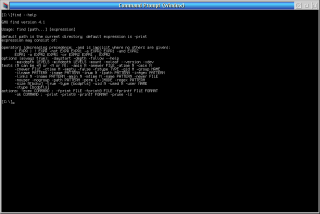The GNU Find Utilities are the basic directory searching utilities of the GNU operating system. These programs are typically used in conjunction with other programs to provide modular and powerful directory search and file locating capabilities to other commands.
The tools supplied with this package are:
- find - search for files in a directory hierarchy
- locate - list files in databases that match a pattern
- updatedb - update a file name database
- xargs - build and execute command lines from standard input



Add new comment